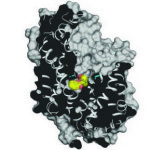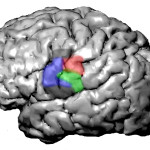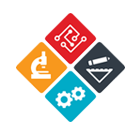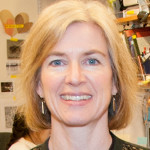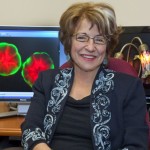Scientists working at the Berkeley Center for Structural Biology in the Advanced Light Source (ALS) recently solved the crystallographic structures of several amine transporters in an effort to better understand why the human brain responds to chemicals like dopamine and serotonin. Their findings will help design drugs to treat neurological diseases and may also lead to a better understanding of how drug addiction can be managed. The work was led by HHMI Investigator Eric Gouaux of the Oregon Health & Science University. Read the ALS Science Highlight.
Computational Researchers Test Advanced Machine Learning Tools for HPC
Deep learning is not a new concept in academic circles or behind the scenes at “Big Data” companies like Google and Facebook, where algorithms for automated pattern recognition are a fundamental part of the infrastructure. A collaborative effort at Berkeley Lab is working to apply deep learning software tools developed for high performance computing environments to a number of “grand challenge” science problems running computations at the National Energy Research Scientific Computing Center (NERSC) and other supercomputing facilities. Researchers in Berkeley Lab’s Biological Systems and Engineering Division, including Kris Bouchard, are using a deep learning library to analyze recordings of the human brain during speech production. More information about deep learning at NERSC.
Maxon Testifies Before House Subcommittee on Research & Technology
The Dec. 8 U.S. House of Representatives Subcommittee hearing looked at “The Future of Biotechnology: Solutions for Energy, Agriculture and Manufacturing.” Witnesses, including Biosciences Principal Deputy Mary Maxon, provided an overview of new and emerging technologies, their current and potential applications, and the role of the federal government in funding and regulation. This is a Subcommittee of the House Committee on Space, Science, and Technology, which is chaired by Lamar Smith (R- Texas). Watch the testimony in the Subcommittee archives.
Could Revolutionary Gene-Editing Technology End Cancer?
Jennifer Doudna, faculty biochemist in Molecular Biophysics & Integrated Bioimaging, and her work on the CRISPR/Cas 9 gene editing system, have been highlighted recently in both The New Yorker Magazine and on CBS This Morning. The coverage discusses the benefits and perils of this technology, which is the topic of an international meeting being held currently at the National Academy of Sciences in Washington, DC.
Bissell Recipient of 2015 Ernst W. Bertner Memorial Award
Distinguished Scientist Mina Bissell of the Biological Systems & Engineering Division accepted the 2015 Ernst W. Bertner Memorial Award last month at the 58th Annual Symposium on Fundamental Cancer Research. The award is conferred annually on a physician or scientist who has made distinguished contributions to cancer research. Established in 1950 in honor of the first acting director of MD Anderson and first president of the Texas Medical Center, it is the oldest award conferred by The University of Texas MD Anderson Cancer Center.
- « Previous Page
- 1
- …
- 201
- 202
- 203
- 204
- 205
- …
- 213
- Next Page »
Was this page useful?


